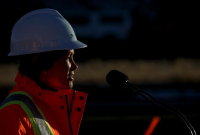Support strong Canadian climate journalism for 2025
Opposition to Alberta's attempt to expand coal mining in the Rocky Mountains is growing with two more towns expressing concerns and a legislature member with the governing United Conservatives backing them up.
The town council of Turner Valley in southern Alberta approved a letter Monday night that asks the province to issue a stop-work order on coal exploration and to restore previous protection for the eastern slopes until public consultations can be held.
"This is the equivalent of us (council) repealing all our zoning bylaws and allowing a tuna-canning facility to open right in your beautiful neighbourhood without asking your opinion," said Coun. Jamie Wilkie.
On Tuesday, the mountain town of Canmore, about 100 kilometres west of Calgary, passed a similar motion. Mayor John Borrowman has been directed to write Premier Jason Kenney asking him to restore the protection policy "recently rescinded without adequate public consultation."
The legislature member for several towns that have voiced concern appears to support their efforts.
R.J. Sigurdson did not reply to a request for comment from The Canadian Press, but told his local paper that the area in question is close to his heart and he "wants to make sure that we're doing everything to protect it as much as possible."
"People have expressed their concerns about the removal of the coal policy," Okotoks Today quoted Sigurdson as saying. "I want to assure people in this area my first and foremost responsibility is to represent the voice and the concerns of the people ... and I’ve heard that voice loud and clear.”
Wilkie said Turner Valley is sending letters to three ministries asking for clarity on what impact mining would have on nearby provincial parks and how mountaintop open-pit mines can be squared with environmental concerns.
The town made major investments in water treatment assuming that the land would be protected, he said.
"We've invested millions in water treatment on the Sheep River," Wilkie said. "We had rules in place when we made those investments."
At least eight communities are upset about the government's plan to dramatically expand coal mining in the mountains. They include the city of Lethbridge with a population of 130,000 and Longview's 307 citizens.
The towns of High River and Nanton, as well as the counties of Ranchlands and Foothills, have all expressed concerns. High River has already sent a letter asking for a pause on coal exploration. More communities, including the city of Calgary, plan debate on the issue.
The government revoked a policy last spring, without warning, that had protected the eastern slopes and peaks of the Rockies for more than 40 years. Since that decision, hundreds of thousands of hectares have been leased for exploration and hundreds of drill sites and kilometres of roads have been permitted.
Coal opponents fear contamination of river headwaters as well as destruction of one of the province's most treasured landscapes, home to endangered and threatened species, including grizzly bears, native cutthroat trout and whitebark pine.
On Monday, in response to news of High River's letter, Energy Minister Sonya Savage said she and Nixon are "considering other options to clarify the government’s approach and demonstrate the stringent environmental protections that remain in place."
The Canadian Press has reported on data that shows contamination from coal mines is already present in Alberta rivers at levels that exceed provincial guidelines. The government has closed the monitoring stations on those waterways.
This report by The Canadian Press was first published Feb. 2, 2021.






Comments